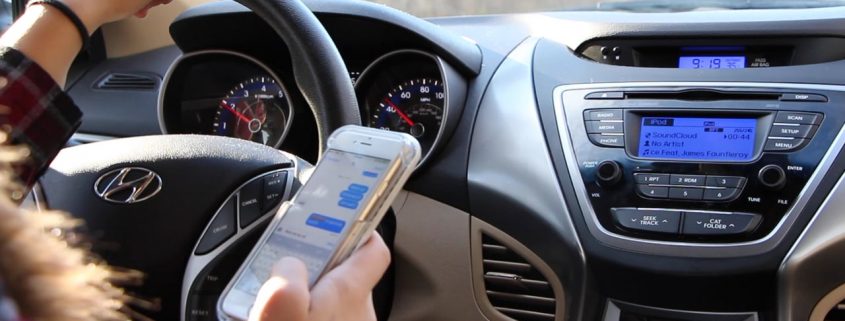Distracted Driving: The Issues, Laws, and Solutions
When we’re driving, we are all distracted. Whether it’s by the radio, the passing scenery through the window, our phones, or even just our own thoughts. And it’s nothing new. Distracted driving has been a leading force in causing car accidents since the inception of the automobile. These days, however, distractions are more prevalent than ever before. Consequently, car accidents due to these distractions are also on the rise.
There is no shortage of distracted drivers on the roads of Melbourne and Brevard County. According to the Florida Department of Highway Safety and Motor Vehicles (DHSMV), Brevard County experienced 1150 distracted driving accidents in 2015. These accidents resulted in 984 injuries and four deaths.
What is Distracted Driving, Exactly?
Distracted driving is a form of driver negligence. It is defined as operating a motor vehicle while also engaged in another activity. In other words, it’s essentially multi-tasking behind the wheel. While we live in the day and age of multi-tasking, it is increasingly difficult for people to focus on a single task while behind the wheel. In the case of driving, this single task requires focusing on the road only, and it’s critical to the safety to everyone sharing the road.
Distracted Driving Facts & Statistics
- Use of a mobile phone while driving — even with bluetooth technology — a driver is four times more likely to cause an accident.
- Mobile phone use plays a contributing role in 1 out of every four car accidents.
- When sending a text message, a driver takes his or her eyes off the road for an average of 4.6 seconds.
- At any given moment in the U.S., over 660,000 drivers are attempting to use and or engage their mobile phone or other cellular device.
- According to the National Safety Council, drivers distracted by mobile phones results in over 1,600,000 automobile accidents annually.
How Does Florida Law Handle The Issue of Distracted Driving?
Florida legislatures adopted a wireless communication prohibition statute in 2013. You can read the full statute 316.305 here on the Florida Senate’s website. Here is the most important language from the text:
A person may not operate a motor vehicle while manually typing or entering multiple letters, numbers, symbols, or other characters into a wireless communications device or while sending or reading data 1on such a device for the purpose of nonvoice interpersonal communication, including, but not limited to, communication methods known as texting, e-mailing, and instant messaging.
The statute does provide for several exceptions to the above rule, such as using a device for the purpose of navigation, or to alert authorities of suspicious or emergency situations.
Although the statute prohibits the act of texting while driving, it is important to note that it is considered a “secondary offense.”
Enforcement of this section by state or local law enforcement agencies must be accomplished only as a secondary action when an operator of a motor vehicle has been detained for a suspected violation of another provision of this chapter, chapter 320, or chapter 322.
This means that a police officer cannot pull over your vehicle or cite you for texting while driving unless the officer is already pulling you over for another offense, such as speeding or running a red light.
Finally, you should also know that your phone records cannot be submitted as evidence that you were using your phone while driving UNLESS you were involved in a crash that resulted in death or personal injury. In other words, this type of evidence cannot be used by law enforcement to prove that you violated the statute.
Solutions to Distracted Driving
Because distracting driving is such a safety hazard on our roadways in Central Florida, it’s important that we consider potential solutions to this issue. Up to this point, policy makers have largely leaned on public awareness and education to combat the problem. Unfortunately, this effort has not proven effective. For example, polls show that the public is well aware of the dangers of texting while driving, yet this has little impact on individual behavior. This is supported by the fact that 94% of people approve of a ban on texting while driving, yet most still admittedly engage in the behavior. Further, a poll by AAA showed that 94% of teen drivers acknowledge and understand the dangers of texting and driving, yet 35% admitted that they do it anyway.
For now, the best solution rests with you. There’s a lot of potential dangers on the road that are out of your control. However, you do have control over your own focus and attention. If everyone did their part, our roads would be that much safer. It’s really the best we can do until self-driving cars eliminate human error from the equation.
Have you or a loved-one been injured in a distracted driving accident?
If you have suffered an automobile accident injury, you may be entitled to compensation for your losses. To find out whether you have a potential injury compensation case, consult with a local accident attorney. If your accident was in the Brevard County area, call (321) 222-0234 for a free consultation with Melbourne Accident Lawyer, John Collingsworth. John is a personal injury lawyer that represents victims in a wide range of automobile, truck, motorcycle, and car accident related matters. Call today to speak directly with a qualified injury attorney.






Leave a Reply
Want to join the discussion?Feel free to contribute!